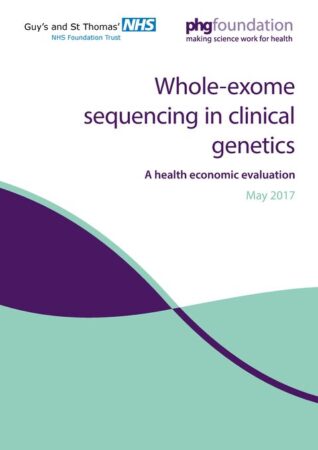Home Publications Reports Whole exome sequencing in clinical genetics
Whole exome sequencing in clinical genetics
A health economic evaluation
Exome sequencing is a relatively new technique that involves determination of the DNA sequence of the comparatively small proportion of the genome that is expressed as messenger RNA. The technique has been shown to greatly increase the likelihood and accuracy of a diagnosis for patients with conditions suspected to be of inherited genetic origin.
King’s Health Partners is working to establish routine clinical use of exome sequencing to enhance diagnostic and treatment pathways for patients. As part of this work KHP in collaboration with PHG Foundation and with funding from Guy’s and St Thomas’ NHS Foundation Trust, set up a pilot to determine whether this currently represents a cost-effective use of NHS resources where diagnosis is otherwise difficult, expensive or unavailable in the required time scale, or would require invasive procedures.
Two clinical scenarios are presented in the health economic evaluation: one where the exome virtual gene panel test is offered in addition to standard genetics tests and another in which it is offered as a ‘near first-line’ test (e.g. after an array CGH test in a case of developmental delay).
The evaluation showed that the virtual gene panel is currently more expensive than conventional sequential testing. However, if the virtual gene panel were provided as a “near first-line test”, and if its costs inclusive of interpretation and expert review could be reduced by around £850 these would be similar to current costs, while diagnostic yield would be increased by around 42%. Proposals to remove confirmatory testing, which would reduce the costs of this test, are under consideration.
Whole-exome sequencing clinical genetics – a health economic evaluation is free to download.
By Gurdeep S Sagoo, Gail Norbury, Shehla Mohammed, Mark Kroese

